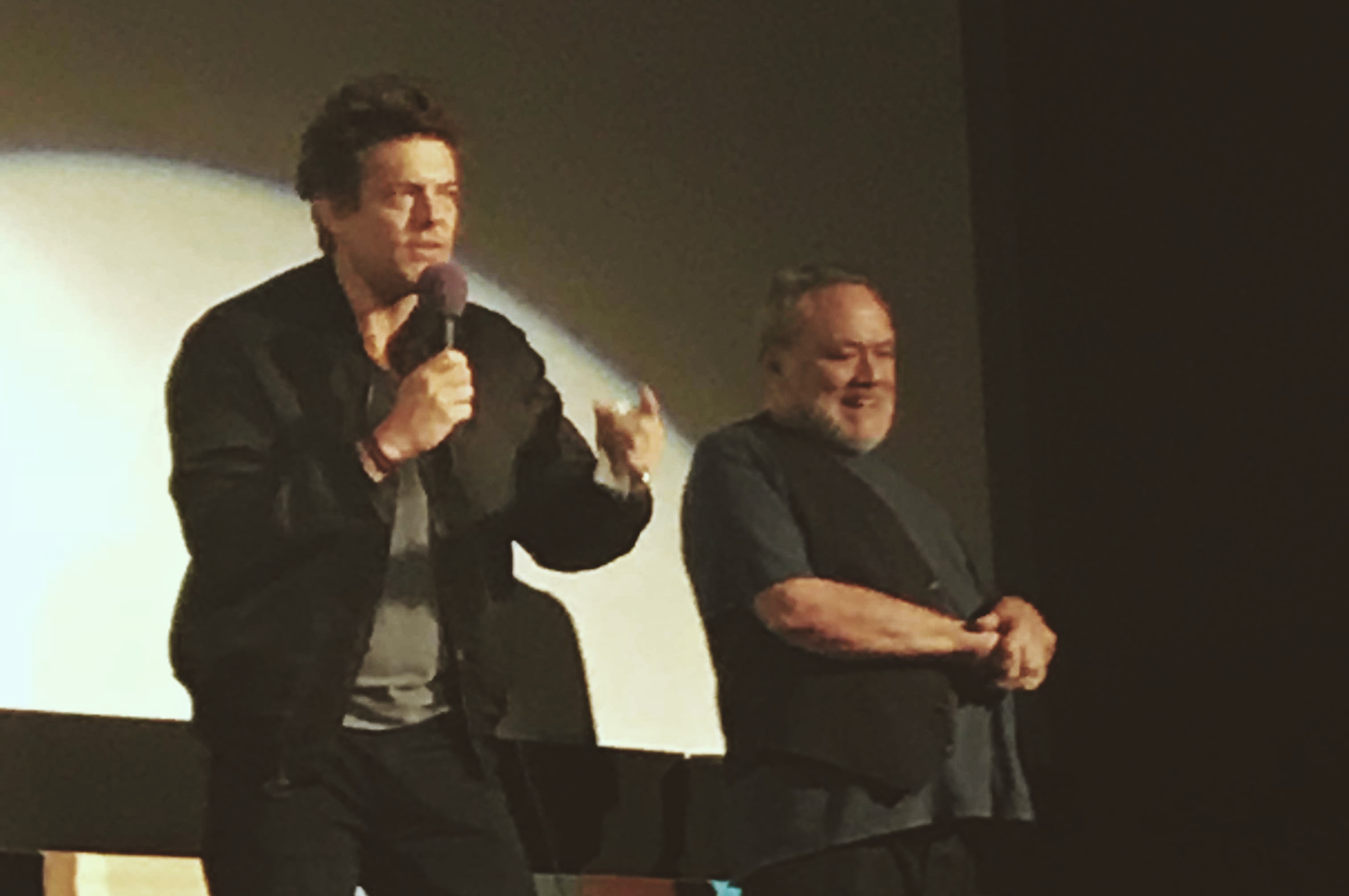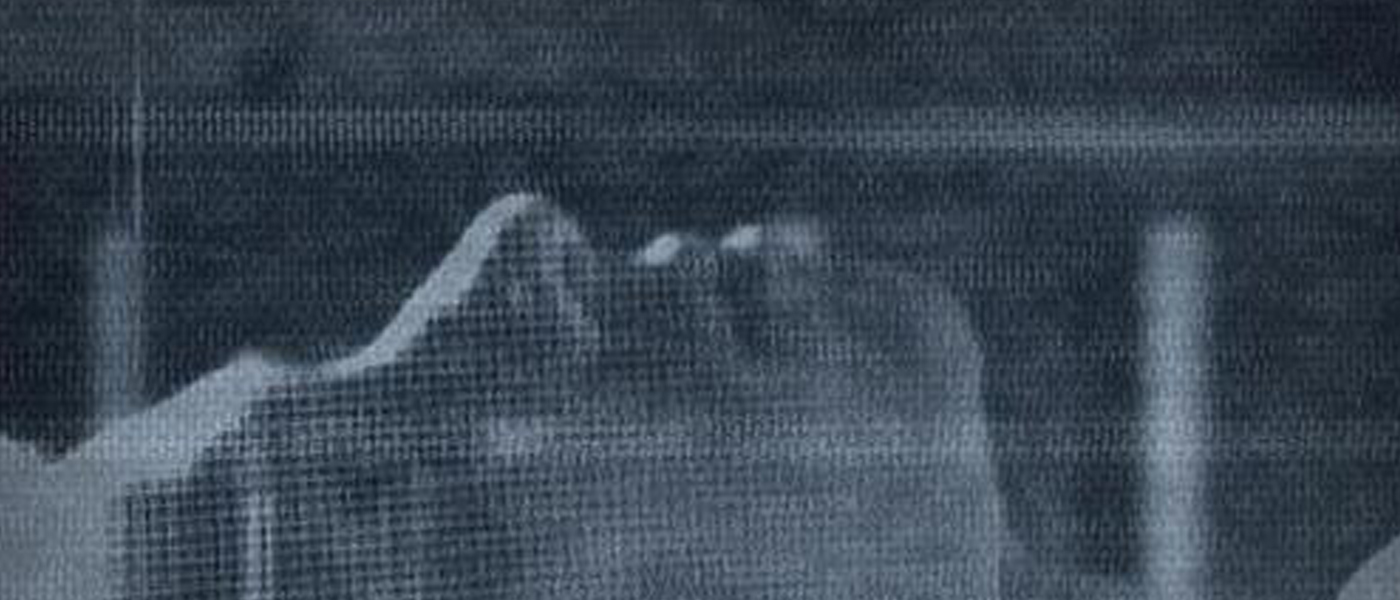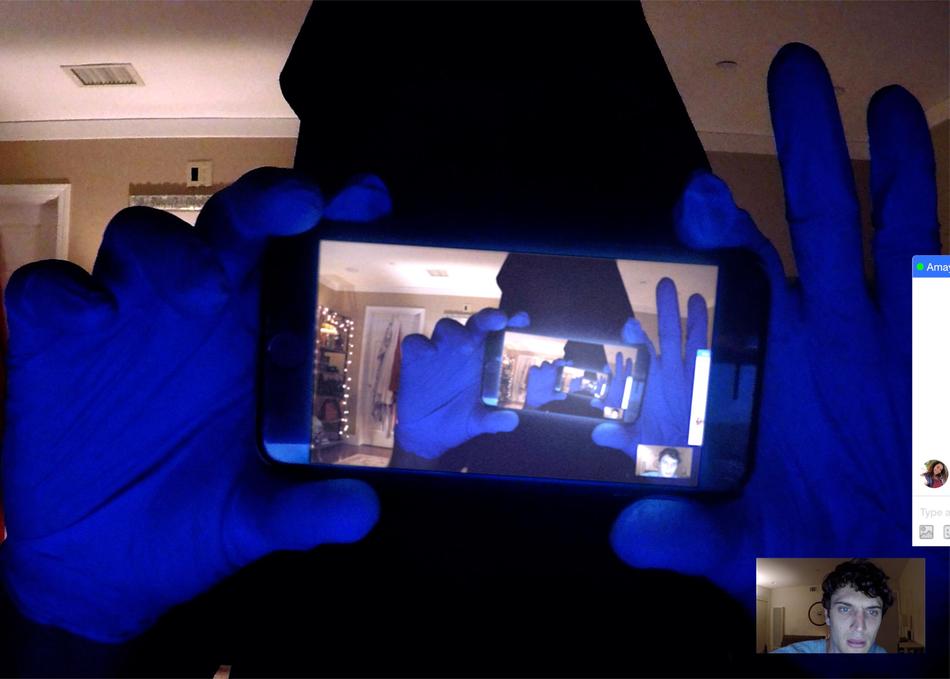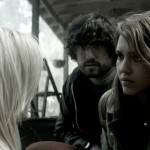When I saw Untitled Blumhouse-Bazelevs Film on the 2018 SXSW lineup, including a press photo with familiar looking chat window peeking from its right side (attached below), an excitement induced smirk came to my face.
With, “A 20-something finds a cache of hidden files on his new laptop and is thrust into the deep waters of the dark web. From the makers of Unfriended, this thriller unravels in real-time, entirely on a computer screen. A warning for the digital age.” as a synopsis, I was pretty certain I knew what I was getting into on March 9th, the day of its premiere. Shortly after taking my seat at the Alamo Drafthouse Ritz, producer Jason Blum took the stage, and energetically confirmed my suspicions. I was about to witness the world premiere of Unfriended: Dark Web.

If you’re a podcast listener, you know my thoughts on the original, (spoiler alert, I’m all about “monitor-horror”), and hearing this sequel announcement news, you can imagine how I felt.
After experiencing 88 minutes of screen-shared madness, the audience was treated to a Q&A with the cast and crew (which is available exclusively for Patreon Patrons now)
[customfont1]A-666 Character Review of ‘Unfriended: Dark Web’[/customfont1]
The next morning, after some sensory recovery, I was able to talk with the writer/director Stephen Susco, and Co-Star Colin Woodell.
Byron McKoy: Thanks for talking to me today, guys. I was lucky enough to catch the premiere yesterday. Had a lot of fun. Can you start out by sharing a little bit about the movie and your role in it?
Colin Woodell: Sure! It’s definitely a film about a young man who is seeking some sort of help in some way to further and better his relationship with his girlfriend. He stumbles kind of across this computer that is belonging to no one for a few weeks and has the audacity to take it and the film opens with him logging into it and ultimately there’s a guilt that’s kind of resounding throughout him the entire time, but ultimately he kinda goes on this journey that is very terrifying because of the repercussions that come with taking this thing. But it was, the process itself, was very much of constantly talking with Stephen and figuring out where we’re going to go with this and how we want to tell this in a way that’s, is this guy a thief? And how do we make this relatable and make an audience want to root for this guy on top of understanding what he did was not necessarily morally correct.
So Stephen, you said yesterday you started shooting in 2016. I imagine it started a little bit before that. How did you become involved in the project?
SS: Blumhouse reached out and said, “hey have you seen our movie Unfriended?” and I was like “oh my god yeah I love that movie.” And they said we’re trying to figure out what to do with it, and my first instinct was “I can’t, because it was great, you know.” I wanted to find a unique thing to direct for my first feature, I was always a little bit anxious about doing a sequel to anything, especially a movie that singular. And I thought about it, and I can’t top that movie, I can’t, I can’t, it was so good. But you know, the testament to Blumhouse and Bazelevs and how they work is that what would you do given these restrictions if you were going to do something that was yours. So I said I’d like to do the opposite. I’d like to do something that’s more thriller than horror, that’s PG-13, not R, where the violence happens off camera instead of very graphically on, where it has characters you like and don’t want to die as opposed to the opposite. I just kind of wanted to try something that was essentially the inverse. And they were game and we cracked it together.
You felt like you couldn’t move on with that same concept? It’s more supernatural, I guess. I don’t want to spoil it… Lets say we remain more “grounded” in Dark Web.
SS: You know, that’s the fun thing about horror. So many different things are scary. Some people are scared by aliens, some people aren’t. Some people are scared of ghosts, some people aren’t. I love ghosts, I love the first movie. I tend towards thriller. Some of my favorite movies are generally more slower paced and I kinda miss thrillers. People don’t make thrillers very much anymore.
I feel like they’re on the up though, which is really cool.
SS: They’re coming back! It’s nice. That was kind of my pitch, it was saying “if we’re not going to do a movie that falls into a familiar pacing and we’re going to try something that’s a little out of the box as far as narrative structure, we can do something that takes its time a little bit, where the audience is starting to see things before the characters get to see things and the tension that that might build, so it was fun to try to crack that nut.
If I’m not mistaken, you wrote the Grudge and the Grudge 2 and Texas Chainsaw 3, right?
SS: Yeah.
So within the genre, you’ve tackled adaptations in writing. What was different when expanding the universe in Unfriended? And I guess what did you take and what did you leave behind?
SS: It was nice to be able to not have the weight of the first movie too much. But what I enjoyed was the restrictions, which is kind of a strange thing to say. I said this last night, you don’t often have an experience where people are really game to try to do something completely new. So to try to figure out a puzzle box of how do you make a computer screen engaging? How do you take these new narrative tools and how do you create more of a Hitchcockian thriller as opposed to something where it’s going to be about the punctuated moments on screen. It was very ground up, and it was more of a combination of that and things I’d been researching about technology and surveillance and what goes down in the deep dark web and that just kind of became the [kernel] of the idea.
Yeah, you mentioned last night that you did some research, I don’t know how much–
SS: Too much.
–about the dark web. Can you talk about diving in there, the tor browser, dark web, deep web, any tips or tricks?
SS: Well, I mean, it’s sort of an intriguing idea. We sort of use AJ’s character to kind of talk about this when he says the internet as you know it is only the surface, and for all intents and purposes, it’s true. We all swim on the surface of this thing we kind of don’t know a whole lot about. And it’s a lot deeper than we think. I sort of talked about it last night, that the deep web is everything search engines can’t really see. But it’s a lot of crap. It’s a tremendous amount of crap with very little organization and it’s all files and fragments, but true to the human condition, that became the place for people to say “oh, now within this space, we’re going to build this other space that’s kind of encrypted and can’t be seen and you have to know exactly where you’re going to get there to do nefarious little things.” It’s essentially like taking a slasher movie from the ‘70s or a [unintelligible] from the ‘60s and having a scene in the parking garage or dark alley. It’s kind of the new parking garage or dark alley. I mean, there are huge marketplaces, billion and billion dollar marketplaces down there. It’s this whole new world, and people swim in that ocean and don’t look down. I remember when I coalesced this idea, I pitched it as Jaws on the computer screen. It’s kind of what I want this to be at its heart. You can’t say it to describe this movie obviously, but that’s how I saw it in the beginning.
Another thing you mentioned yesterday. It started in 2016 and it was shot in 9 days…or was it less than that?
SS: Actually, we carved it down to 8 days. We had 5 days of rehearsal, we had 9 filming days and because of my incredible actors we carved one day out of 9.
For both of you, what was it like working on such a tight schedule?
CW: Amazing. And looking back on it, moreso. During the experience it was exhausting and hard to do anything outside of it. But you know, we were in this world completely and entirely and you know, getting there early to talk to him and you know after we wrapped and staying afterwards to continuing these conversations about what’s next to do tomorrow was a complete necessity for the two of us in trying to build the world on Matias’s screen and also his relationship to every single person that he’s interacting with. This was one of the most unique and probably the most unique experience I’ve ever had working on anything because there was this incredible combination of doing a play where we’re not stopping and this performance is raw. I can also see my performance, which is very odd.
Yeah, I’m curious about actually You shot with GoPros, did you say they were attached at to laptops?
SS: Yep, on the top of the screen. And then there were scripts on the computers because again, because some of them got the scripts a day or two before rehearsal. And then filmed 47 pages in the first day. But again, I think this is kind of a tribute to the form. We didn’t have the pressure of company moves and lights and massive crews and all those other considerations, it created an environment where, I remember we talked about this a lot on the last day of rehearsal, we said “rehearsals are going to continue.” We’re just going to keep, it felt like we were workshopping the idea the whole time we were filming the idea, which continued into post because its essentially an animated film with a performance element. We did a couple pick up days where we can back and we have a new sequence that we discovered through rewriting it in the animating and editing process. It was fun to be able to have actors where the workshopping never stopped, so we have so many different versions. There’s actually a whole ‘nother 90 minute movie with all different footage that’s kind of a romantic drama, where that’s really fun and lovely and has so many different character [beats].
I remember with the first film, Nelson said that they were filming PG-13 rated and R rated cuts with of all the footage that they had. It’s interesting that you say you could make another movie that’s a romantic drama.
SS: Yeah, we had to deliver the first cut on such a timeline and because we were animating as we went, we didn’t have a chance to look back. So we just took the script and started building the scenes and we finished the day before we had to deliver the first cut. And we just, we went “how long is this movie?” And we put it all together and it was 2 hours and 48 minutes long.
Oh, wow. You did talk a lot with Nelson, right?
SS: Oh, Nelson was essential. And Nelson was, I had meals with Nelson before we started filming to pick his brain. He was very involved.
In what other ways was it helpful approaching the sequel with him?
SS: Well, he was pretty much, obviously with Adam Sidman and Timur, he was the only person who had ever done this before. He and Adam and Timur invented a whole new narrative form where it’s not a found footage film. You are the protagonist. It’s totally different. So I needed a lot of help to know what I was getting into and the script was a good start, but I spent 20 years using different tools. Being able to work that closely with these guys was essential because they really told me a lot of what to watch out for and then were heavily involved through the editing of it.
Last question. Are you guys working on anything else you can talk about right now?
CW: I have a film coming out in two weeks which was with Steven Soderbergh called Insane. And that’ll be great too because what he wanted to sort of touch about was he shot the entire film on an iPhone. A lot of his shots that we did were very wide, there were not many close ups. A lot of his shots were also from outside of a bar, or like you know, from afar, so it was this feeling of someone watching you with their phone. It’s very similar, so it’s pretty exciting for me.
It’s a cool year.
CW: Yeah, in three weeks there will be these two films that have an eerie place in my heart because I’m so proud of them but also it’s a terrifying world that I’m a part of.
SS: I hope the next movie that he does, the opening shot is a hero shot of him on a cliff at sunset, swooping around.
The release date of Unfriended: Dark Web is currently unknown.
Transcribed by the talented Maggie Iken.




